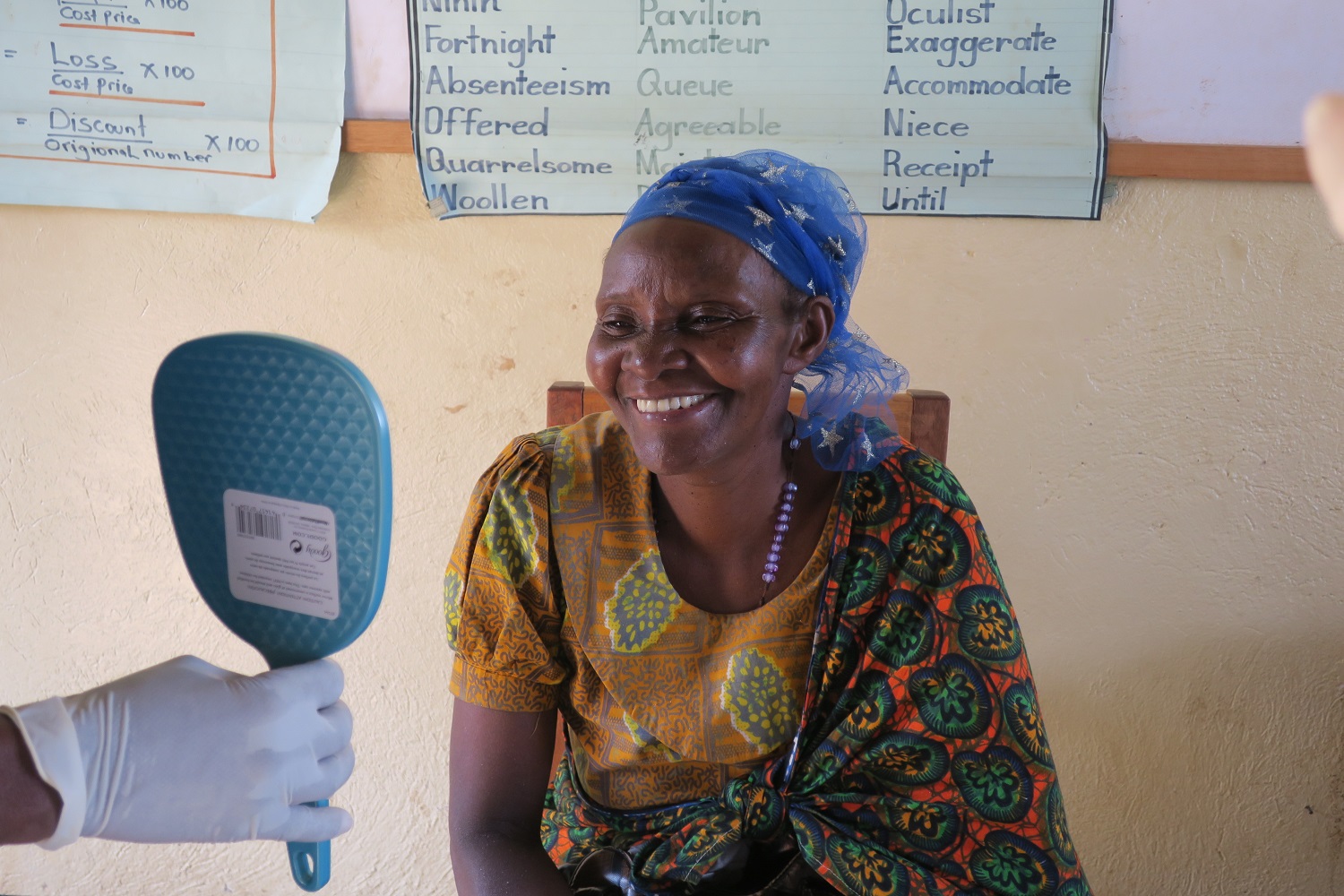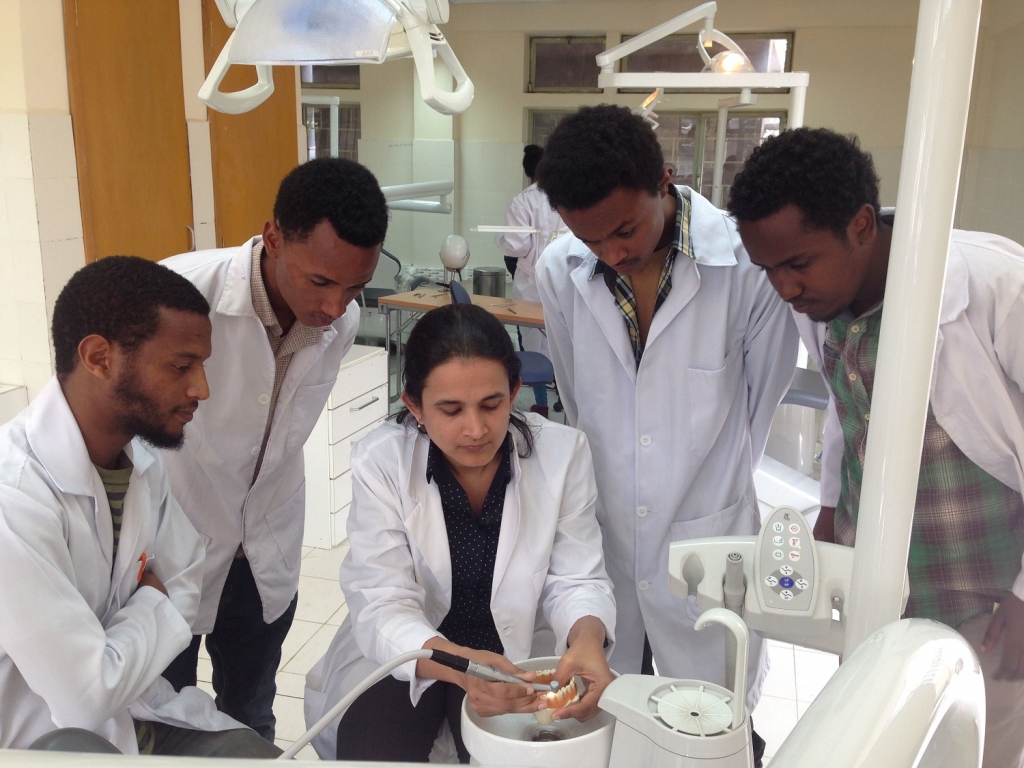U of T Dentistry’s collaborations in Africa help both students and patients
 Featured Image Caption
Featured Image Caption
Placements and partnerships in Ethiopia and Uganda share ideas and expertise across continents.
Posted on August 29, 2017
By Erin Vollick
As every dentist knows, the best kind of learning happens when you get your hands ‘wet.’ With two new collaborations in Africa, students and instructors at the Faculty of Dentistry have a unique opportunity to deepen and share their knowledge half a world away, in some of the most underserviced pockets on the planet.
Being a resource for Ethiopia
In late 2014, the Faculty of Dentistry became an official partner in the Toronto Addis Ababa Academic Collaboration (TAAAC), a U of T initiative that builds health infrastructure and capacity in the populous Ethiopian capital city. Dental education is an emerging priority for the country, which has fewer than 250 dentists serving 95 million people. The new Addis Ababa University School of Dentistry, one of just two public dental education institutions in Ethiopia, graduated its first class in 2016 — with a little help from U of T.
In December 2015, Dentistry professors Jim Lai (Vice-Dean, Education) and Ernest Lam (Associate Dean, Graduate Education) went on the first of two month-long teaching rotations. In May 2016, a second group included Clinical Associate Joel Rosenbloom, Prof. Herenia Lawrence and two students.
One pivotal project involved laying the groundwork for new graduate specialty programs at the fledgling school. Lam taught radiology while Lawrence taught a class on dental public health and began a joint research project with the school’s Dean, Dr. Fantaye Wondwossen, on the effects of chewing khat (a plant with amphetamine-like effects that Ethiopians chew as a cultural practice).

U of T Dentistry student Bhavna Sharma demonstrates technique to students at the Addis Ababa University School of Dentistry. Photo courtesy Lindsay Louwagie.
Making a difference to student experience
The Addis Ababa school has two clinics: patients are seen in the older clinic, which frequently loses power and is ill-equipped. The new, state-of-the-art clinic is filled with equipment donated from the dental school at Bergen University, Norway, but challenges to infrastructure — running water and power —need to be addressed before patients can be seen there.
Lai, who taught periodontology, saw first-hand how the Addis Ababa students are affected by the lack of equipment. He wondered why they didn’t measure the depth of gum disease on diagnosis—it was because “their probes were all either broken or bent,” he says. There was only one working high-speed drill for a class of approximately 23 students. So the second U of T contingent came with heavy baggage: eight high speed drills, amalgam, radiography film, plastic teeth for restorative practice, and sundry other dental supplies.
They also brought students. Just weeks shy of graduation, Lindsay Louwagie and Bhavna Sharma embarked on the school’s first-ever two-week peer mentorship service learning rotation. Their travel was funded through the Faculty’s Student Service Learning Outreach Program, part of the Boundless campaign.
Sharma and Louwagie’s class for third-year students was a hit, and by the end of the fortnight, says Louwagie, the Ethiopian students had overcome a great deal of their clinical experience deficit. “A few of them were at par with what we do. They had tactile skills and were very gifted.”
Expanding service in Uganda
In February 2017, a pilot service learning elective got underway: two fourth-year students participated in a two-week rotation through Kabale, Uganda. The rotation piggybacked on the work of the Bridge to Health Medical and Dental Program, a multi-disciplinary mobile health unit that draws on expertise from U of T Dentistry’s faculty, clinical associates and alumni.
In the Kabale region, “there are no x-rays, no lights, no suction, no chairs, no drills,” says David Chvartszaid, head of the Graduate Prosthodontics program. He accompanied Prof. Izchak Barzilay and students Elahe Behrooz and Courtney David to Uganda for the pilot study.
Barzilay had participated in the Bridge to Health program before, and decided he wanted to do more than extract teeth — he wanted to create a field denture program, shifting the health care priority from straight triage to recovery. While the team extracted approximately 1,000 teeth over the duration of the brigade, they also produced between 60 to 70 thermoplastic dentures, each piece finished and fitted over the course of a single day. Behrooz and David also prepped about 100 fillings.
Despite the impressive volume of treatment work, the team had to turn away more people than received treatment. Still, the crew’s impact was undeniable. “The patients told me, ‘Last year you stole our smiles. This year you’ll give them back,’” recalls Barzilay.
The intensity of the experience pushed students into a mode of autonomous problem solving and action. From thinking on their feet to syncretizing their knowledge, says Chvartszaid, the students’ learning experience was profound.
Becoming a truly global partner in dentistry
Practicing, teaching or learning dentistry abroad isn’t an impulsive response to need, but rather a strategic initiative of the faculty. “We know that students who embark on service learning opportunities gain a breadth and depth to their learning experience that they would not otherwise have,” says Dean Daniel Haas.
And while these two African excursions offer a living classroom experience, they also express a deep commitment to sharing the Faculty’s expertise and resources — and by extension, becoming a true global partner in dentistry. It is a partnership of equals. “We can’t impose our Canadian practice standards,” says Lam. “Our role is to give them the tools to meet their needs, and they will pick and choose the tools they need.”
More trips to both Uganda and Ethiopia are planned. And Lai hopes that at some point, faculty members from Addis Ababa can enjoy brief rotations in Toronto, learning or honing skills on modern equipment that can then be adapted to the challenges and needs back home.
“This is going to be a long haul,” he says. “We aren’t going to change anything in one visit.”
